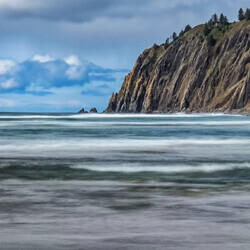The Manzanita Writers Series and the Hoffman Center for the Arts announce the winners of the 6th annual Neahkahnie Mountain Poetry Prize, which honors poets who live on the North Oregon Coast or have strong connections here.
Submissions were judged by Warrenton resident and poet Logan Garner, the 2023 winner of the Neahkahnie Mountain Poetry Prize. He lives and writes on Oregon’s north coast at the mouth of the Columbia River..
Garner awarded first place to Florence Sage for her poem “Goodbye: The Second Law of Thermodynamics.” About the poem, Garner said, “The collection of images in this piece, both elegy and love poem, hold up entropy as a mirror (or perhaps an explanation) for loss, aging and loneliness—topics we tend to avoid, yet which are unavoidable. At once fatalistic and grateful for the present, Goodbye reminds us that, in spite of the inevitable—whether we can truly prepare for it or not—we are yet part of a greater, magnificent whole, just enough comfort to bear it all. I read this poem on a loop for several minutes, just for it not to come to and end. But, as the narrator so beautifully teaches, it must.”
As first prize winner, Sage will receive a $100 cash award. She is is current MC and a regular reader at the monthly Ric’s Poetry Mic in Astoria, a poetry event presenter, and recent poetry columnist for HIPFiSH Monthly. For 25 years she was a founding production crew member for the annual Fisher Poets Gathering in Astoria.
Her full-length poetry collections are: Nevertheless: Poems from the Gray Area (2014); The Man Who Whistled, The Woman Who Wished: A Polish-Canadian Story (2021); What to Do with Night: Poems (2023). All are at RiverSea Gallery, Godfather’s and Time Enough Books, and in Astoria and Warrenton libraries.
Second place was awarded to Astoria resident Marianne Monson for “Stillicide” Garner commented: “Frida Kahlo has never been so visible and fully-formed to me as she is now, after having spent significant time with Stillicide. This poem celebrates her personhood well beyond her life as a means to producing works of art, an otherwise-common tendency of historical summaries. The narrator of Stillicide evokes with such intimacy a life fraught with illness, poverty, tragedy, personal and political strife, and a sense of self made to balance on a knife’s edge between cultures and eras, even life and death. Short of reading a singularly poetic biography, this poem does well to bring something of Frida’s soul to this reader.”
Monson is the author of twelve books for children and adults, with an emphasis on frontier-era women’s history. Marianne holds an MFA in Creative Writing from Vermont College of Fine Arts is founder of a literary nonprofit, The Writer’s Guild, and writes from a 100-year-old house in Astoria, Oregon.
Garth Upshaw won third place for his poem, “Crocodile Rock.” “Crocodile rock is a few things,” said Garner. “Examination of childhood and coming of age. An evaluation of mental illness and our choice to adhere to its stigma or to set it free. A practice in compassion and support. The short, clipped lines of this poem and the images therein evoke a nostalgia for youth’s simplicity and carry the reader along that stream of consciousness we experience when we call memory forth, through years or decades, to compare to the present. The narrator’s struggle to come to terms with change, perhaps their adjustment to reality, ultimately brings about a conscientious compassion that stuck with me in the best way.”
Upshaw spends much of his vacation time in Astoria and Warrenton. “I feel a strong connection to the river and the ocean and love camping in Fort Stevens.”
In addition to the three prize-winners, Garner also recognized works by two other poets as honorable mentions:
- Connie Soper, Portland/Manzanita: “The Language of Solitude”
- Karen Keltze, Tillamook, OR: “Studying War”
All three prize-winning poems are viewable here.
In addition, the winning poets will read their work at a special Hoffman Center event on Sunday, April 14th which will celebrate the launch of two new poetry collections by Valerie Witte, and part-time Neahkahnie resident Joy Manesiotis. The reading begins at 4 pm. For details and registration, click here.
The next submission period for the Neahkahnie Mountain prize is January 2025.


